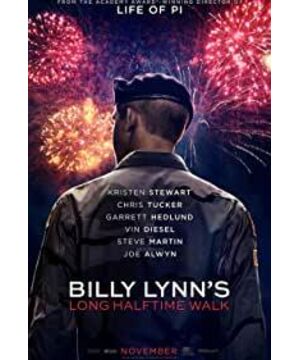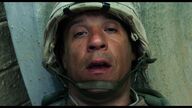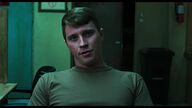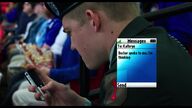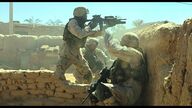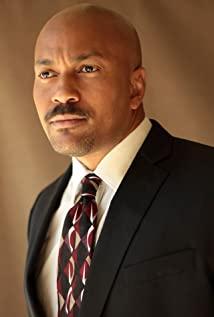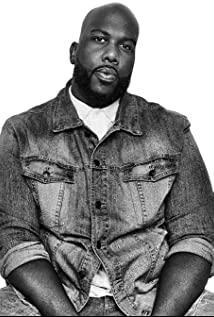A lot of the novel is cynical about the hypocrisy of the wealthy class, the owner of the Cowboys, and the acerbic metaphors are easy to follow, making Billy more like an observant anthropologist than a silly white Texas teenager who graduated from high school. Town Youth (which makes the novel seem like a second flu, and also makes the characters slightly distorted), this vitriolic sarcasm is not so straightforward and aggressive after the video.
My favorite part of the novel is Billy's two days at home. Luther's family atmosphere and Billy's childishness are very vividly portrayed. The film only retains the miserable sibling conversations and family dinners. There is still a movie that has not been filmed. After the halftime show, he called his family. While listening to his family praise him for being handsome on TV, he was also vivid to his mother’s inner OS. In the novel, his interaction with his family is quite exciting. .
As the centerpiece of the halftime show, the novel strongly depicts Billy's high-pressure tension in the grand pomp and the absurdity brought by the singing and dancing soft erotic atmosphere ("the whole stage has become a grand foreplay", I feel myself Be the "pole of pole dancing").
The extreme audio-visual technology in this part of the movie enables the tension caused by the sound and light on the big stage to directly affect the audience's physiological response, and because the movie is strongly inserted into the battlefield flashback, it gives more meaning to the "absurdity" (heroism is The despicable consumption of commercial capital, the divinity of experiencing the test of life and death as a soldier, and "I need a soldier that ain't scared to stand up for me, known to carry big things)” and other superficial lyrics mixed together is ridiculous and pathetic), Beyonce’s soft-erotic body performance in the novel (with the seductive “stimulant” of the uniform of the Army Honor Guard) has become a leftover. (Because of the whole back view). [Seeing that TV entertainment and pop music are so blackened in this large segment, as a practitioner, I am also convinced in capital letters]
The most "plus points" of the movie are reflected in Billy's recollection of Iraq's daily attendance and positional encounters. These are the real brain holes of the movie script (especially the two scenes of night search and pipeline close combat). According to the information Ang Lee also visited Iraqi war veterans and did a lot of homework. During the night search, he rarely felt the director's sympathy for the Iraqis: the man who is the head of the family is protecting his family's possessions in a country without law and order. A few pistols were caught as jihadists (although it may be true), and the hatred of the family looking at the "aggressor" in that scene is unpleasant - this is obviously the history of the country that has been invaded People will intentionally take pictures. In contrast, a football team owner who had never been on the battlefield preached the war of aggression as a "war of good and evil" in his speech, and a team manager struttingly armed with guns in a high-level banquet hall with layers of police and security guards— —These are the freedoms that the US imperialists profess to defend.
Regarding the battlefield life in Iraq, Billy's biggest feeling in the novel is the fear of "random life and death" when he is surrounded by hatred in a strange country - the locals hate them, and they want to use cold guns and stray bullets to let them take the lunch while they are farting and hiccupping a little. (In the words of the Turkish Communist Party: caught in the vast ocean of "people's" war).
In the movie, Billy, while ranting about an unjust war, led to more fighting for the war, he also had a little bit of self-consciousness to treat the fighting objects as individuals rather than alien monsters.
In the movie, Shroom said before the war, "They (jihadists) are real fighters. We are in other people's territory, and we must remain in awe." Billy finally choked the rich businessman's sentence "Even if you are not stingy, we don't want to be used by business. Jihad. Disciples have more respect for us than you." This is also the most bitter irony in the whole film - in an era when soldiers are manipulated by politicians, consumed by commercial enterprises, and quirky by the people who eat melons, the real "value" is instead Can it only come from enemies whose blades face each other and hate each other? ("At least the jihadists will only kill you and not make you look like a complete fool" (Mango))
As a young soldier with little culture, Billy in the novel has experienced an "ordinary day in America" and seen the huge gap between the two worlds. How to deal with my sister's huge medical bills? How to buy a team? How to leverage the so-called capital leverage? How to manage the inventory of supplies that equip athletes to the teeth? Who sent himself to the battlefield to block the hole, and who made the "huge stupid things" such as the Super Bowl and halftime show happen and cannot be avoided? (Billy is eager to learn, wants to understand the richness of this world, and sets himself the goal of reading as many books as Shroom and being a learned person) - Behind these questions is actually the author Ben Fonden's opinion on the increasingly divided America social worries. Looking at the various social ecology of this year's U.S. imperial election, ten years after the U.S.-Iraq war, the worries of intellectuals like Ben Fontaine may only be aggravated.
The Hollywood producer with his mouth full of trains in the movie finally said to Billy in a rare and serious way, we can't understand your experience, your story, but this country needs to understand. ——It is also possible that the director is speaking from the producer’s mouth that Americans not only need to understand their own soldiers, but also those Billys who were sent to the front as cannon fodder, but also need to understand those “others” who are different from themselves, Even the "enemy" of the complete opposite, even if it can't understand, at least maintain a little respect.
The novel ends with Billy saying goodbye to Feision, the little brother is still stubborn, but he knows in his heart that he will never see her again sadly (his sister did not drive to the stadium to find him).
At the end of the movie, Billy said goodbye to his sister in person, and then said goodbye to the mushroom in his mind. Although it was to complete the tear-jerking sensation of the final real movie moment, it was also a positive account of him and the two who were the closest spiritually. The ending of the relationship between the people: "Rejecting my sister to return to my comrade-in-arms" & "Inheriting Shroom's spiritual mantle to understand people and love people (even if his professional mission is to kill)" - this sounds sad, but also the director jumps out of the framework of the novel Gentle hope for this young man Billy.
In short, novels are still "American novels," but movies are no longer purely "American narratives."
Ben Fonden pays attention to those "giant stupid things" that people are accustomed to in American social life but deepen the division and estrangement. Although pig's feet are soldiers who go to foreign countries to fight, their foothold is still in the United States that intellectuals worry about. Wealth divide, class barriers, capital operation, ideology, etc.
As an East Asian, Ang Lee added some less-American extensions to this purely American story (such as Sergeant Shroom's Hindu beliefs, the "experience" of Iraqis being invaded), and finally vaguely promoted the idea of "the benevolent loves others" (Although preaching means about equals nothing).
It's like if the theme is an alien invasion like the Trisolaran, Ben Fontaine is concerned about the division of the earth's human beings, and Ang Lee may go to explore the human confusion of the Trisolaran.
View more about Billy Lynn's Long Halftime Walk reviews


